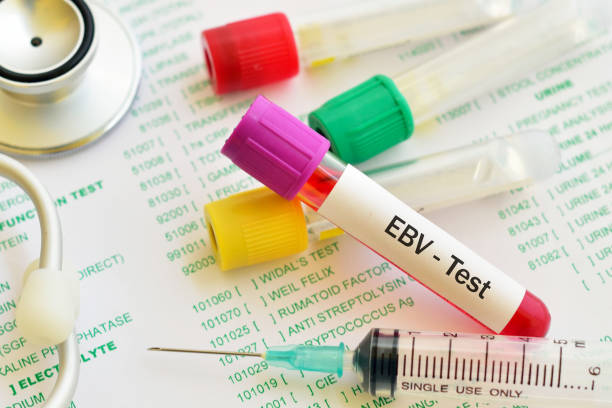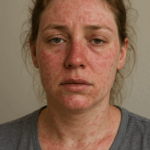At AskDoctor.ai, we know how challenging it can be when Epstein-Barr Virus (EBV) reactivation disrupts your life. Whether it’s constant fatigue, a sore throat that won’t go away, or just feeling off, it’s tough to manage. You’re not alone—many people experience these same struggles. That’s why we’ve put together this guide to help you understand what’s going on, how to find relief, and what steps you can take to feel better. We’ll share practical advice, treatment options, and tips from others who’ve been through it. Our goal is to make it easier for you to navigate this so you can get back to living life without the constant worry.
Epstein-Barr Virus (EBV) reactivation is a common health issue that many people don’t even know they have. Once you’ve had EBV, it stays in your body, usually without causing problems. But for some, it can reactivate later in life, leading to symptoms like fatigue, fever, and brain fog. According to the National Institutes of Health (NIH), about 90-95% of adults worldwide have had EBV at some point, though not everyone experiences reactivation.
If you’ve been feeling unusually tired or unwell, it could be EBV. Understanding why it reactivates, how to spot the symptoms, and knowing your treatment options can make all the difference. This guide will help you learn more about EBV reactivation and give you practical tips to manage it so you can feel like yourself again.
- What Is Epstein-Barr Virus (EBV)?
- Symptoms & Causes of EBV Reactivation
- Treatment Options for EBV Reactivation
- Inspiring Recovery Stories: Overcoming Epstein-Barr Virus
- Simple Lifestyle Changes to Manage EBV Reactivation and Feel Better Faster
- Final Thoughts: Taking Control of EBV Reactivation for a Healthier You
What Is Epstein-Barr Virus (EBV)?
Epstein-Barr Virus (EBV) is one of the most common viruses in the world—about 95% of adults have had it at some point, even if they didn’t realize it. It’s part of the herpesvirus family and is best known for causing mononucleosis (mono), often called the “kissing disease.” Mono can leave you feeling exhausted, with a sore throat, fever, and swollen glands.
Once EBV is in your body, it never completely goes away. It usually stays dormant in your immune cells, causing no harm. But in some people, it can reactivate later—especially during times of stress, illness, or a weakened immune system. When this happens, it can bring back symptoms like fatigue, brain fog, and body aches, affecting your energy and daily life.
Symptoms & Causes of EBV Reactivation
When the Epstein-Barr Virus (EBV) reactivates, it can cause a range of symptoms, sometimes mimicking the original infection or showing up in more subtle ways. The virus, which typically stays dormant after the first infection, can resurface under certain conditions, leading to troubling symptoms that may affect your daily life. Here’s what you need to know:
Common Symptoms of EBV Reactivation:
- Fatigue: This is one of the most common and overwhelming symptoms. People often feel extremely tired, even after a full night’s sleep. Research from the Mayo Clinic shows that fatigue from EBV can persist for weeks or months, making it challenging to keep up with daily activities.
- Sore Throat: You might experience a sore throat similar to the one you had during your first EBV infection, which can make swallowing difficult.
- Fever: A mild fever can accompany EBV reactivation, though it doesn’t always happen in every case.
- Swollen Lymph Nodes: Lymph nodes, particularly in your neck or underarms, may become tender or swollen as your body tries to fight the virus.
- Headaches: Headaches are common during reactivation, sometimes lasting for days.
- Muscle and Joint Pain: Aches in the muscles or joints can also appear, making movement uncomfortable.
- Cognitive Issues (Brain Fog): Difficulty concentrating or remembering things is another frustrating symptom, often referred to as “brain fog.” This can interfere with work, school, or even daily tasks.
What Causes EBV Reactivation?
EBV tends to stay dormant after your first infection, but it can be reactivated by several factors, including:
- Weakened Immune System: Conditions like HIV/AIDS or autoimmune diseases, as well as treatments like chemotherapy, can compromise your immune system, which might trigger EBV reactivation.
- Stress: Both physical and emotional stress can impact your immune system, making it easier for EBV to reactivate. Stress reduction is an important part of managing the virus.
- Other Infections or Illnesses: When your body is dealing with another infection, it can wear down your immune system and allow EBV to reactivate.
- Medications: Certain medications, especially those that suppress your immune system (like steroids), can also trigger reactivation.
Understanding these symptoms and triggers can help you manage EBV reactivation more effectively. If you notice these signs, don’t hesitate to talk to your doctor for guidance and treatment options.
Treatment Options for EBV Reactivation
Although there’s no cure for Epstein-Barr virus (EBV), managing its reactivation can help ease symptoms and speed up recovery. Treatment options range from conventional medications to natural remedies that can boost your immune system. Here’s a closer look at both approaches.
Conventional Treatments
- Pain Relief & Fever Management: Over-the-counter medications like ibuprofen (Advil) or acetaminophen (Tylenol) can help ease the headaches, muscle aches, and fever that come with EBV reactivation. These simple medications can make a big difference when you’re feeling unwell.
- Rest & Hydration: Fatigue is one of the most common symptoms of EBV reactivation, affecting up to 90% of people with chronic cases of the virus. Getting plenty of rest and staying hydrated are key to giving your immune system the strength it needs to fight the virus. It might seem obvious, but sleep is essential—don’t skip it!
- Corticosteroids: If the virus causes significant inflammation, especially in the throat, liver, or nervous system, doctors may prescribe corticosteroids. These can help reduce swelling and ease more severe symptoms.
- Antiviral Medications: While antiviral drugs aren’t usually the go-to treatment for EBV reactivation, they may be used in certain cases, especially for those with weakened immune systems. Medications like valacyclovir may help reduce symptoms and viral load, particularly in immunocompromised individuals.
Alternative & Natural Treatments
In addition to traditional treatments, many people find relief by using natural remedies that help strengthen their immune systems and reduce inflammation. Here are some options to consider:
- Herbal Supplements:
- Echinacea and Astragalus are both known for their immune-boosting properties and might help reduce the frequency and severity of EBV flare-ups.
- Licorice Root has anti-inflammatory effects that can soothe the immune system and may help reduce the viral impact on your body.
- Echinacea and Astragalus are both known for their immune-boosting properties and might help reduce the frequency and severity of EBV flare-ups.
- Vitamin & Mineral Support:
- Vitamin C: This powerful antioxidant helps boost your immune defenses and may help reduce viral replication.
- Vitamin D: Research has found that up to 60% of people with EBV reactivation have low levels of vitamin D, suggesting that getting more through sunlight or supplements might help.
- Zinc: This mineral plays an essential role in immune function and may help shorten recovery time from an EBV flare-up.
- Vitamin C: This powerful antioxidant helps boost your immune defenses and may help reduce viral replication.
- Probiotics: Keeping your gut healthy is essential for immune function. Research has shown that probiotics can help regulate your immune system and reduce inflammation, potentially easing EBV symptoms.
By combining conventional treatments with these natural remedies, you can give your body the support it needs to manage EBV reactivation. Of course, if symptoms persist or become severe, it’s always a good idea to reach out to your healthcare provider.
Inspiring Recovery Stories: Overcoming Epstein-Barr Virus
Living with Epstein-Barr Virus (EBV) reactivation can feel overwhelming, but recovery is possible. Many people have faced the same struggles and found ways to heal. Here are two real stories of individuals who turned their health around:
Stacie’s Journey to Wellness
Stacie endured years of unexplained fatigue and cognitive challenges, finding little relief through conventional medicine. Determined to regain her health, she sought the expertise of Dr. Anju Mathur at Angel Longevity Medical Center. Through a personalized plan focusing on immune support and lifestyle modifications, Stacie experienced significant improvement. Her story highlights the power of integrative approaches in overcoming EBV.
Size Happy’s Personal Battle with EBV
The creator of the YouTube channel Size Happy openly shares her struggle with EBV, detailing symptoms like persistent fatigue and brain fog. By embracing medical guidance, dietary changes, and self-care practices, she managed to reclaim her vitality. Her candid account serves as a beacon of hope for others navigating similar health challenges.
These stories remind us that recovery is not only possible but achievable. With the right support, lifestyle adjustments, and a commitment to healing, you can take back your life from EBV.
Simple Lifestyle Changes to Manage EBV Reactivation and Feel Better Faster
Recovering from EBV reactivation isn’t just about meds—your daily habits matter too. Small lifestyle changes can help speed up recovery and reduce flare-ups. Here are a few simple tips to help you heal:
- Get Plenty of Sleep – Aim for 7-9 hours each night. Sleep boosts your immune system, helping your body fight off infections.
- Manage Stress – Chronic stress can trigger EBV flare-ups. Try relaxation techniques like deep breathing, yoga, or taking a walk to calm your mind.
- Eat a Balanced Diet – Focus on fruits, veggies, lean proteins, and healthy fats. Avoid sugary or processed foods that can weaken your immune system.
- Stay Hydrated – Drink plenty of water throughout the day to support your body’s natural detox process and maintain energy.
- Avoid Alcohol & Smoking – Both can compromise your immune system, so it’s best to avoid them while healing.
- Exercise Lightly – Gentle activities like walking or stretching can help boost energy without overtaxing your body.
By making these changes, you’re giving your body the best chance to heal. You don’t have to go it alone—check out more tips on managing EBV reactivation and boosting your immune system here.
Take small steps every day, and you’ll likely start to feel better soon!
FAQs on Epstein-Barr Virus (EBV) Reactivation
- Can EBV reactivation cause chronic fatigue syndrome?
Yes, EBV reactivation has been linked to chronic fatigue syndrome (CFS), particularly because it can trigger lingering immune responses that contribute to prolonged fatigue. - Is EBV reactivation contagious?
No, EBV reactivation itself is not contagious. However, since the virus can still be present in saliva, there is a small risk of transmission through close contact, such as kissing or sharing utensils. - Can stress trigger EBV reactivation?
Yes, chronic stress can weaken the immune system, making it easier for EBV to reactivate. Therefore, managing stress through relaxation techniques and lifestyle changes is essential for prevention. - Does diet affect EBV reactivation?
Absolutely! A well-balanced, anti-inflammatory diet that includes plenty of vitamins and antioxidants can help support immune function and reduce the chances of reactivation. - How can I prevent EBV reactivation?
To minimize the risk, it is important to maintain a strong immune system by eating a nutrient-rich diet, managing stress effectively, and ensuring you get enough quality sleep. Additionally, regular exercise and avoiding immune-compromising habits can further support prevention.
Final Thoughts: Taking Control of EBV Reactivation for a Healthier You
Epstein-Barr Virus (EBV) reactivation is a manageable condition, though it can certainly disrupt daily life. By understanding the symptoms, causes, and treatment options, you can take steps to control the condition and improve your quality of life. Whether through conventional medicine or alternative therapies, many options are available to help you feel better and manage your symptoms effectively.
If you’re experiencing symptoms of EBV reactivation, don’t hesitate to reach out to your healthcare provider for guidance and support. And remember, you’re not alone—many others have successfully managed EBV reactivation, and with the right approach, you can too.
Have you had an experience with EBV reactivation? Share your story or ask questions in the comments below. Let’s support each other on the path to recovery!
References:
Centers for Disease Control and Prevention (CDC)
National Institute of Allergy and Infectious Diseases (NIAID)
National Institutes of Health (NIH)
Angel Longevity Medical Center
Mayo Clinic









Leave a Reply